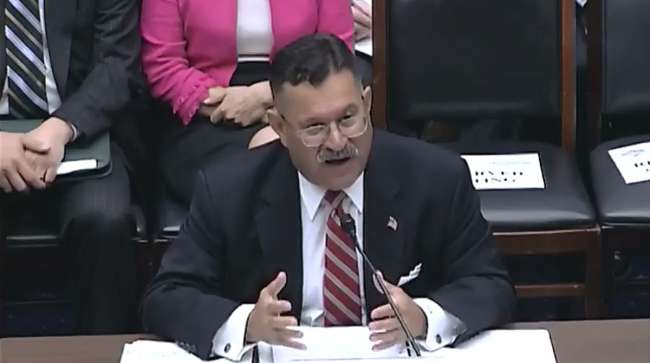Senior Reporter
FMCSA Chief Ray Martinez Says ELD Guidance for Ag Haulers Forthcoming

WASHINGTON — New electronic logging device guidance that would address flexibility concerns raised by aspects of the agriculture sector will be unveiled shortly by the Federal Motor Carrier Safety Administration, the agency’s chief told House lawmakers May 22.
The regulatory guidance will aim to provide additional flexibility to haulers, with a focus on livestock, agency chief Ray Martinez said, adding, “We are actively engaged in discussions with the agriculture transport sector and specifically livestock haulers.”
“Much of what we have to do is continue outreach and education and flexibility because of the unique nature of their sector,” Martinez told the Highways and Transit Subcommittee in what was his first hearing before Congress since he was confirmed for the job Feb. 13. “I believe that if we continue to work together, we can get there.”
The ELD rule took effect in December, and FMCSA coordinated about 550 educational sessions about its requirements. ELDs replace paper logbooks to record a truck’s driving time to collect accurate hours-of-service data.
Responding to industry concerns, FMCSA issued two 90-day temporary waivers from the ELD rule for parts of the agriculture sector. Congress also responded by including in a recently enacted $1.3 trillion funding law an agency directive not to enforce the ELD rule for agriculture-related transportation through Sept. 30.
A funding bill under consideration in the House would deny funding through fiscal 2019 for the enforcement of the ELD rule on livestock haulers.
Meanwhile, a cadre of lawmakers have echoed the concerns expressed by farmers and livestock haulers, emphasizing a need to ensure those haulers receive greater flexibility while on the road. “It just doesn’t work so well for rural folks, mom and pop, all that,” Rep. Doug LaMalfa (R-Calif.) told Martinez during the hearing. “You agree that hauling livestock is a heck of a lot different than hauling a lot of other products, whatever inanimate objects might be on a truckload, right? The challenges that faces; weather, heat and all that.”
Subcommittee Chairman Sam Graves (R-Mo.) agreed flexibility is necessary to improve the way farm products and livestock are transported.
“We can’t have those rigid ELD standards when you’ve got a three-week window to move the entire country’s worth of fertilizers,” Graves told Transport Topics shortly after the hearing. “It creates a special set of circumstances.”
The ELD rule was touted by the Commercial Vehicle Safety Alliance, whose president, Capt. Christopher Turner of the Kansas Highway Patrol, addressed the subcommittee after Martinez. The group insists the agency should devote its attention to other concerns, in addition to ELDs. As Turner put it in his written statement, “Implementation of the electronic logging device requirement consumed a disproportionate amount of the agency’s time and resources.”
“It is an initiative that CVSA fully supported, and we worked closely with the agency on implementation. However, the fact remains the agency had little time for other, equally important efforts,” Turner said.
Aside from ELDs, Martinez assured lawmakers he would task his agency with communicating with Congress on policy related to the ongoing truck driver shortage as well as autonomous technology. The administrator argued such vehicles would help improve highway safety in the coming years.

